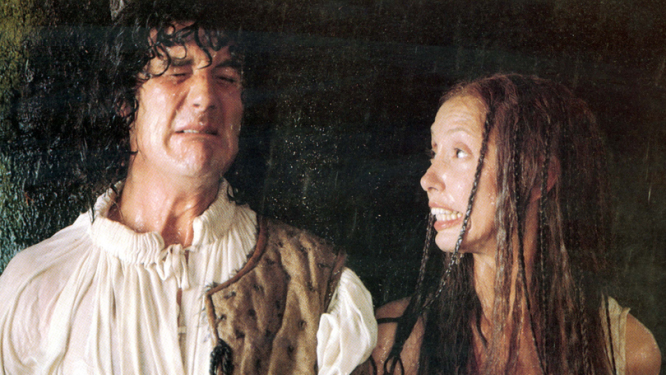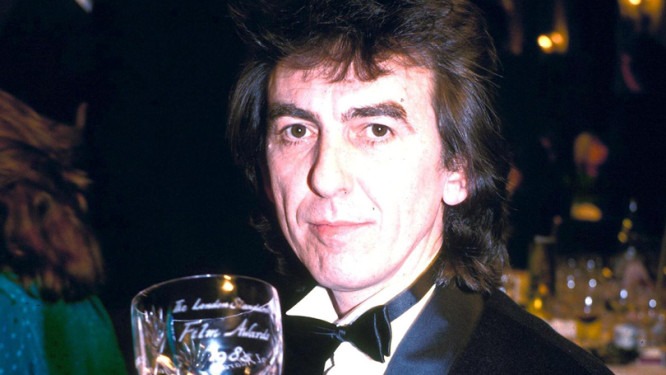My favorite Beatle has always been George Harrsion, who was miscast as “the quiet one” in the PR for the band. After all, nearly anyone standing next to John Lennon would appear to be quiet, but it was George who insisted on things like the lads tuning their instruments before a concert which no one in the audience could possibly hear. It was George who bitched about taxes (first). It was George who wrote “Piggies” which allegedly inspired Manson. But the key thing about George, at least as it pertains to this particular documentary, was that he was not interested in celebrity—he was interested in art.

And English things. Art and English things.
If you don’t know the story, when Monty Python was making the Life of Brian, they ran out of money. The distributor got cold feet. And (for English films) there weren’t a lot of options. Eric Idle is at a party in Los Angeles and complaining to (longtime Python fan) Harrison about their situation and George says something to the effect of, “That sounds like a funny movie. I’d like to see that.” And then he produces the money for the Pythons to finish.
I have heard that story for years and thought “That’s a good amount of money to have.” But until seeing this particular documentary, I did not realize that George had had to put up his house (and another property) to come up with money. And in order to make the whole scheme work, Denis O’Brien (who had assisted Harrison with various issues throughout the ’70s) came up with a plan: They would create a movie studio, which Harrison would want to call British Handmade Films.

With mastermind Denis O’Brien.
But apparently you couldn’t apply “British Handmade” to anything without permission. I was unclear whether it was a matter of an existing trademark or something the UK government controlled. It seemed like the latter, especially when Harrison pointed out the companies that carried that name also sucked and/or lost money. So, “Handmade Films” it was, though it’s interesting to note at this late date that at least part of the impetus for the studio (beyond Life of Brian )was that George wanted to see English films centered around English culture, instead of American films (I think in particular) or quasi-Brit films like James Bond.
Which, I think, is kind of cool. A part of what is making American movies so very bland these days is that they’re not really American any more. They’re tempered by global interests and censored to appease Chinese tyrants (who are savvy enough be pro-America in ways American movies haven’t been since the ’80s)—to say nothing of bowing to local tyrants and probably others of whom we are less aware. Handmade’s British focus earned Harrison the title of “Savior of the British Film Industry”, which he wryly points out meant they were the only studio surviving.
Over the next ten years Handmade would make 23 movies of varying degrees of quality and increasingly move away from Harrison’s vision which was basically “Let’s give money to artists we like so they can make the art we like” and more toward O’Brien’s ambitious international dreams. The first film HandMade financed was the classic Brit gangster flick The Long Good Friday. Which, had he known what it was about, Harrison never would’ve financed because he really preferred comedy or very British slice-of-life kind of things. I would say that he felt there was enough violence in the world, he didn’t really want to add to it.

O’Brien wanted Grace Jones (!) to be the ingenue in “Mona Lisa”.
The first film HandMade actually made, however, was Time Bandits, that Python-esque action comedy film where Terry Gilliam’s mad brilliance (brilliant madness?) began to shine through. In fact, per this film, the song “Only A Dream Away” was actually Harrison chiding Gilliam:
Stumble you may with the elementary
Lucky you got this far
All you owe is apologies
But if the future Madman of La Mancha was peeking through, O’Brien’s ambitions were almost immediately plain: He had a brilliant idea to create (in essence) a Python factory. This would be a conglomerate operating out of the Caribbean and producing comedy units (and merchandising) at a regular pace. The Pythons thought about this (they say) and rejected it utterly because that’s just not how Python worked. In fact, Harrison visited the set of Life of Brian and then quickly stopped visiting because the making the Python sausage—well, hell, it probably reminded him of the Beatles-sausage at the end (as featured in the almost unwatchable Let It Be).
As a result The Meaning of Life wouldn’t be a HandMade film. In classic archival footage, an interviewer asks George if he’s sorry he lost them and he says, he hasn’t lost them. He still gets to see the movie and he’s glad he could help them out. And they’re all still friends, which seems to have been true.
Time Bandits would be followed by the very British The Missionary and Privates on Parade, and then cataclysmic flop Water. But then, nobody expects every movie to be good and/or successful, and probably HandMade could’ve continued on until George’s death in 2001 but for one thing: It stopped being fun. Whatever the general merit of O’Brien’s ideas, he was pretty clearly bitten by the “importance” bug. Whereas George would hire someone because he liked him as an artist, O’Brien started getting the idea that he was the creative genius and began to meddle. Worse, he was bringing in the precisely the sorts of movies that George wasn’t interested in, like the Sean Penn/Madonna vehicle Shanghai Surprise.

Michael Palin wrote himself in as Robin Hood for “Time Bandits” but was coaxed out of the part, at which point he became one of the multiply-reincarnated lovers (with Shelley Duvall).
At the height of “Penndonna” celebrity (nobody called it that), Penn was bullying the director and making bad press and George (who would end up writing songs for the movie!) had to go down and patch things up. As I pointed out earlier, if he had ever been enamored of fame, he was over it by this time, and this was the last thing he wanted to do.
So, on the three-point documentary scale:
- The subject matter is interesting. Is it important? I don’t know. Did HandMade really save the British film industry? Or did it just give a handful an artists an opportunity to do some things they otherwise wouldn’t have been able to? I suspect the latter, but that’s something more than nothing. And HandMade’s contribution may have been primarily one of morale (“hey, this is a thing that can still be done by Brits”) but that, too, is more than nothing.
- The presentation is fun, but increasingly less fun as it wears on. I can’t really blame the documentarians for this, it’s the nature of the beast on this kind of project. Eventually, things go to hell. And so there are a lot of fun interviews especially up front, but these get darker and sadder with time.
- There is a slant here. We could call it a “pro-George” slant. Denis O’Brien is not interviewed at all, only archive footage of him is included. To the point where I thought he had died. The film doesn’t mention the lawsuit Harrison successfully pursued against O’Brien and O’Brien’s subsequent troubles.
So on that last point, we could also say it’s not really “anti-O’Brien” since O’Brien’s troubles were hardly limited to HandMade’s tale. But it feels a little weird not to have included him, or said at least something like “Denis O’Brien told us to ‘sod off'” or whatever. I’d still recommend it for anyone with an interest in oddball creativity. The Boy enjoyed it quite a bit, too, and he was pretty much only familiar with Life of Brian and Time Bandits.

George at (I believe) the ten year anniversary/obituary of HandMade.
